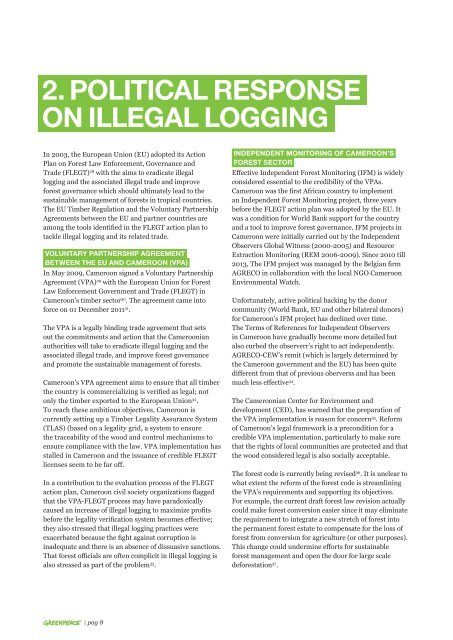CCT’S TIMBER TRADE FROM CAMEROON TO EUROPE
ZioqW
ZioqW
Create successful ePaper yourself
Turn your PDF publications into a flip-book with our unique Google optimized e-Paper software.
2. POLITICAL RESPONSE<br />
ON ILLEGAL LOGGING<br />
In 2003, the European Union (EU) adopted its Action<br />
Plan on Forest Law Enforcement, Governance and<br />
Trade (FLEGT) 28 with the aims to eradicate illegal<br />
logging and the associated illegal trade and improve<br />
forest governance which should ultimately lead to the<br />
sustainable management of forests in tropical countries.<br />
The EU Timber Regulation and the Voluntary Partnership<br />
Agreements between the EU and partner countries are<br />
among the tools identified in the FLEGT action plan to<br />
tackle illegal logging and its related trade.<br />
VOLUNTARY PARTNERSHIP AGREEMENT<br />
BETWEEN THE EU AND <strong>CAMEROON</strong> (VPA)<br />
In May 2009, Cameroon signed a Voluntary Partnership<br />
Agreement (VPA) 29 with the European Union for Forest<br />
Law Enforcement Government and Trade (FLEGT) in<br />
Cameroon’s timber sector 30 . The agreement came into<br />
force on 01 December 2011 31 .<br />
The VPA is a legally binding trade agreement that sets<br />
out the commitments and action that the Cameroonian<br />
authorities will take to eradicate illegal logging and the<br />
associated illegal trade, and improve forest governance<br />
and promote the sustainable management of forests.<br />
Cameroon’s VPA agreement aims to ensure that all timber<br />
the country is commercializing is verified as legal; not<br />
only the timber exported to the European Union 32 .<br />
To reach these ambitious objectives, Cameroon is<br />
currently setting up a Timber Legality Assurance System<br />
(TLAS) (based on a legality grid, a system to ensure<br />
the traceability of the wood and control mechanisms to<br />
ensure compliance with the law. VPA implementation has<br />
stalled in Cameroon and the issuance of credible FLEGT<br />
licenses seem to be far off.<br />
In a contribution to the evaluation process of the FLEGT<br />
action plan, Cameroon civil society organizations flagged<br />
that the VPA-FLEGT process may have paradoxically<br />
caused an increase of illegal logging to maximize profits<br />
before the legality verification system becomes effective;<br />
they also stressed that illegal logging practices were<br />
exacerbated because the fight against corruption is<br />
inadequate and there is an absence of dissuasive sanctions.<br />
That forest officials are often complicit in illegal logging is<br />
also stressed as part of the problem 33 .<br />
INDEPENDENT MONI<strong>TO</strong>RING OF <strong>CAMEROON</strong>’S<br />
FOREST SEC<strong>TO</strong>R<br />
Effective Independent Forest Monitoring (IFM) is widely<br />
considered essential to the credibility of the VPAs.<br />
Cameroon was the first African country to implement<br />
an Independent Forest Monitoring project, three years<br />
before the FLEGT action plan was adopted by the EU. It<br />
was a condition for World Bank support for the country<br />
and a tool to improve forest governance. IFM projects in<br />
Cameroon were initially carried out by the Independent<br />
Observers Global Witness (2000-2005) and Resource<br />
Extraction Monitoring (REM 2006-2009). Since 2010 till<br />
2013, The IFM project was managed by the Belgian firm<br />
AGRECO in collaboration with the local NGO Cameroon<br />
Environmental Watch.<br />
Unfortunately, active political backing by the donor<br />
community (World Bank, EU and other bilateral donors)<br />
for Cameroon’s IFM project has declined over time.<br />
The Terms of References for Independent Observers<br />
in Cameroon have gradually become more detailed but<br />
also curbed the observerr’s right to act independently.<br />
AGRECO-CEW’s remit (which is largely determined by<br />
the Cameroon government and the EU) has been quite<br />
different from that of previous oberverss and has been<br />
much less effective 34 .<br />
The Cameroonian Center for Environment and<br />
development (CED), has warned that the preparation of<br />
the VPA implementation is reason for concern 35 . Reform<br />
of Cameroon’s legal framework is a precondition for a<br />
credible VPA implementation, particularly to make sure<br />
that the rights of local communities are protected and that<br />
the wood considered legal is also socially acceptable.<br />
The forest code is currently being revised 36 . It is unclear to<br />
what extent the reform of the forest code is streamlining<br />
the VPA’s requirements and supporting its objectives.<br />
For example, the current draft forest law revision actually<br />
could make forest conversion easier since it may eliminate<br />
the requirement to integrate a new stretch of forest into<br />
the permanent forest estate to compensate for the loss of<br />
forest from conversion for agriculture (or other purposes).<br />
This change could undermine efforts for sustainable<br />
forest management and open the door for large scale<br />
deforestation 37 .<br />
| pag 8



